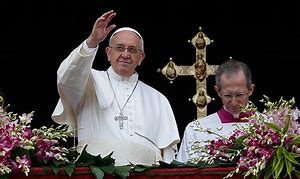Speaking from the Vatican, the pontiff celebrates the resurrection of Christ, but warns that war-torn countries need greater support.

Easter Sunday – known to be the most important and of course joyful day on the liturgical calender as Catholics around the world remember the sacrifice which Jesus made so that all his brothers and sisters in Christ could live.
But did the Pope’s speech in the Vatican this year leave us with this sense of joy or was it simply a warning that we must change our ways for the better if we want to see the Catholic Faith continue to provide hope and peace in our world?
Sunday 1st April marked Easter Sunday this year. Undoubtedly, a day associated with celebrating the resurrection of Jesus, the Son of God, from the tomb where he was laid to rest on Good Friday. This mass is often considered to be the highlight of the liturgical year with many vigil services as well as a number on Easter Sunday itself.
However, the biggest mass is certainly the one celebrated in the Vatican, led by Pope Francis, in front of tens of thousands of pilgrims who flock to St Peter’s Square.
Throughout his five years as Pope, Pope Francis (formerly known as Jorge Mario Bergoglio) has been known to express his views on the conflict and unrest in some parts of the world and this year was certainly no exception.

Following the solemn celebration of Easter mass, Pope Francis voiced his own views on the world and on the core beliefs of the Catholic teachings during the formal ‘Urbi et Orbi’, the Easter message which the Pope presents each year from his balcony on St Peter’s Basilica.
He opened the celebration by expressing his wishes to spread the good news of the resurrection with “every house and every family, especially where the suffering is greatest, in hospitals, in prisons.” This was of course a rather positive message which truly highlights the Pope’s belief that our religion can bring hope and happiness to others. However, this message soon turned into a more serious appeal.
Hope and Faith
In a plea to Jesus himself, the Pope reveals his prayers for those who are in need: “we ask the risen Jesus, who turns death into life, to change hatred into love, vengeance into forgiveness, war into peace”.
There is no doubt that this strong desire for change links to the ongoing conflict in other areas of the world who are ever so worthy of our prayers and our help. This is something which Pope Francis went on to address, tackling each of the war-torn areas in turn and thus helping to highlight the huge number of problems.
As members of a strong faith, must help to alleviate, where we can, the pressures felt by those involved. The Pope revealed his hopes for:
“Peace for the Middle East… who struggle to find the road of agreement, that they may willingly and courageously resume negotiations to end a conflict that has lasted all to long.
Peace in Iraq, that every act of violent may end, and above all for dear Syria, for its people torn by conflict and for the many refugees who await help and comfort”
He continued to make reference to other hubs of conflict in the world and offered them prayers and support.
However, having attempted to dig deeper into the Pope’s words, I believe it is now our responsibility to help provide aid to those who are truly in need and who fear for their lives each and every day. I for one could not envisage living such an existence and it certainly has left me thinking about the changes I could make in order to improve the lives of others.

The first port of call would certainly be the through donation to the charities around us. Throughout the period of Lent SCIAF (Scottish Catholic International Aid Fund) have had a huge appeal in order to raise money for those who struggle to get by on their own like those in Cambodia.
It is Pope Francis’ own moving words, “In the poor and outcast we see Christ’s face; by helping and loving the poor, we love and serve Christ”, which feature on the SCIAF box. These are certainly inspiring words which help to demonstrate how we should lead our own lives, striving to offer assistance and endearment to those who need it most. After all, the Gospel tells us that Jesus came from very little and he was extremely thankful to those who clothed him when he was naked and fed him when he was hungry.
Pope Francis then left us with the crucial message:
“Peace in the whole world, still divided by greed looking for easy gain, wounded by the selfishness which threatens human life and the… selfishness that continues in human trafficking, the most extensive form of slavery in this 21st century.”
Without doubt Pope Francis’ approach is one which divides the public. Personally, I believe his words of wisdom help to convey the message that change is vital and that we must not merely accept the ongoing conflicts which claim thousands upon thousands of needless deaths each year.
It is certainly promising that the leader of our Catholic Faith is so outspoken and truly committed to ensuring changes are made and I hope that this message can continue to be shared and acted upon in the years to come. Playing an active part in these changes is undoubtedly something I am set on doing and I hope that many of my peers will join me.
- by Katie Hunter, Deputy Editor-in-Chief
- Sources: BBC News, The Scotsman


You must be logged in to post a comment.